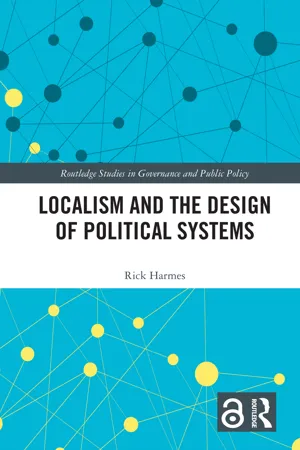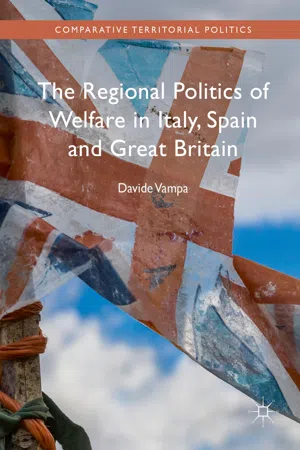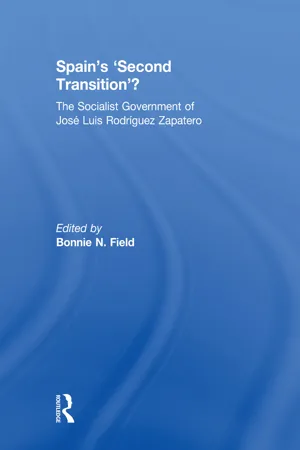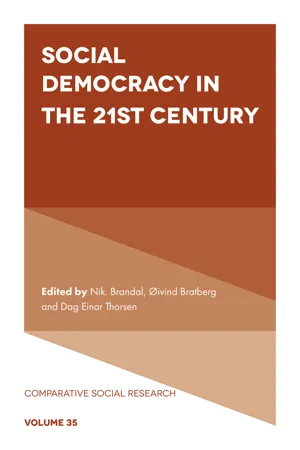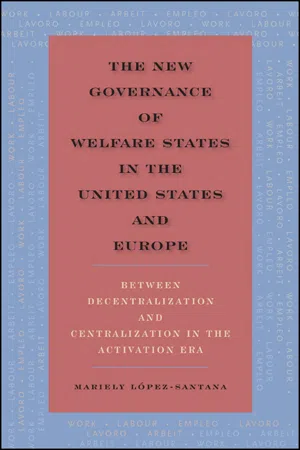Devolution in Spain
Devolution in Spain refers to the transfer of powers from the central government to regional governments, particularly in regions like Catalonia and the Basque Country. This process has allowed these regions to have greater autonomy in areas such as education, healthcare, and culture. Devolution has been a key aspect of Spain's efforts to accommodate its diverse cultural and linguistic identities.
7 Key excerpts on "Devolution in Spain"
- eBook - ePub
- Rick Harmes(Author)
- 2020(Publication Date)
- Routledge(Publisher)
...After 1978, the process of devolution began in a reasonably consensual manner; but this approach became more difficult to maintain as nationalist sentiment resurfaced in Spain during the 1990s. Federations work best when their members feel that they are part of a genuine partnership which respects the diversity of all its members. The PP, which has never been particularly inclined to celebrate the cultural and linguistic diversity of Spain, now became determined to limit any further concessions to the regions. The mounting use of Spanish nationalist rhetoric by the PP was seen as provocative by many Catalans. However, from Spain’s point of view, Catalonia is simply too big and too integral a part of the state to be allowed to secede. Its loss would almost certainly signal a huge crisis of identity for the nation as a whole. Nevertheless, the emergence in 2017 of an overtly secessionist challenge is also a clear sign that Spain’s quasi-federal model has failed (Dowling, 2018: 157–159). Explanation of the Catalan crisis must also take account of factors relating to the micro-institutional design of the Spanish state. Micro-institutions are often invisible to the outsider, but they can have a major impact on political events. They provide the rules and cultural practices which determine how the macro-institutions of the state work in practice (Dunleavy, 2019: 39). Spain’s current procedures for devolving new powers to the autonomous communities are cumbersome, and far too prone to being subverted by partisan political haggling. This is evident in the way in which the PP supported Andalusia’s autonomy statute in 2006 but fiercely opposed the one that was negotiated with Catalonia in the same year, despite the two containing many of the same provisions (Keating and Wilson, 2009: 555). The fact is that the Spanish state lacks a proper constitutional mechanism for dealing with intergovernmental matters...
- eBook - ePub
- Soeren Keil, Elisabeth Alber, Soeren Keil, Elisabeth Alber(Authors)
- 2021(Publication Date)
- Routledge(Publisher)
...Article Two largely enshrines a mononational vision of the Spanish state. Unlike some of the other cases examined in this special issue, decentralisation in Spain was not necessarily viewed through the prism of conflict resolution. Rather, it was sold as a tool of reconciliation, state-building, economic efficiency and democratisation. This, however, is not to deny that decentralisation has served as a mechanism to better manage territorial disputes, particularly given the ethnoterritorial diversity of the state. Much like the short-lived Second Republic (1931–1939) whereby territories like the Basque Country and Catalonia were granted a right to territorial autonomy, the right to self-government in the 1978 Constitution also ‘made a significant contribution to the resolution of ethnoterritorial conflicts’ (Moreno, 2001, p. 54). More recently, however, the territorial model has come under increased pressure and scrutiny. From Consensus to Crisis: The Evolution of Spain’s Decentralised Model Spain’s pacted transition is often exemplified as a successful model of transition that not only facilitated moves towards democracy, but further entrenched this through the hollowing out of powers to regionally elected tiers of government (Beramendi & Máiz, 2004, p. 123). Decentralisation was purported as a flexible model that granted rather extensive self-governing powers to the ACs. The granting of further powers in Spain has been a consistent characteristic of the system, but further devolution has not been part of a holistic programme of decentralisation. In the case of those ACs which pursued the slow track process of autonomy, further autonomy has been rolled out in an attempt to symmetrise the system and dilute claims of ethnoterritorial distinctiveness from the historic nationalities (Máiz et al., 2010)...
- eBook - ePub
- José M. Magone(Author)
- 2017(Publication Date)
- Routledge(Publisher)
...The present issue is about the open-ended nature of the process. As already mentioned in Chapter 3, there are three different views on how to finalise the whole devolution process. The rejection of many articles of the Catalan statute by the Constitutional Court in 2010 led to a considerable radicalisation of the pro-independence parties in Catalonia. The economic crisis and the accumulated debt of the Catalan government led to a major administrative and financial re-centralisation of power to the detriment of the autonomous communities. This reinforced even further the radicalisation in Catalonia towards unilateral independence. In contrast, Lehendakari Iñigo Urkullu distanced himself from the Catalan approach, and advocated a referendum on independence as in Scotland, pacted with the central government. The main question would be if the ‘Basque Country should form a voluntary union with Spain or become independent’ (El País, 27 September 2015; Radio Inter, 6 October 2015). p.161 In sum, Spain is presently in a major period of turmoil due to the Catalan independence movement and similar aspirations in the Basque Country, and needs to find a compromise formula between a level playing field model (café para todos – coffee for all) and accommodation of the demands of the historical regions and their special position (hecho diferencial – differentiated autonomy) in Spanish quasi-federalism. The institutionalisation of intergovernmental relations between the central government and the regions We can differentiate at least four phases in the development of intergovernmental relations in Spain. The first phase ran from 1981 to 1991 and established the first structures of intergovernmental relations. The main legal framework was the Law for the Harmonisation of the Autonomous Process (Ley Organica para la Armonización del Proceso Autonómico – LOAPA) adopted in 1983...
- Davide Vampa(Author)
- 2016(Publication Date)
- Palgrave Macmillan(Publisher)
...© The Author(s) 2016 Davide Vampa The Regional Politics of Welfare in Italy, Spain and Great Britain Comparative Territorial Politics 10.1007/978-3-319-39007-9_6 Begin Abstract 6. Spain: Finding a Balance Between Territorial Equality and Strong Regional Identities Davide Vampa 1 (1) Department of Politics and Public Policy, De Montfort University, Leicester, UK End Abstract Spain can be considered, together with Italy, as having a ‘regionally framed’ welfare system (Kazepov 2010 : 60). This means that regions play a central role in the elaboration and implementation of social policies. However, as in Italy, this has not always been the case. Until the late 1970s, when the Francoist dictatorship collapsed, regional authorities in Spain generally did not exist—or had only very limited powers. Only in the last three decades have the Autonomous Communities managed to obtain an increasing amount of responsibilities from the central government. This has not occurred homogeneously and institutional asymmetries have become an important feature of the decentralised Spanish system. Yet, unlike the Italian regions, the Spanish Autonomous Communities cannot be grouped into two well-defined categories, since the process of devolution has been the outcome of bilateral interactions between regional governments and the central government. Generally, as underlined by Magone (2009 : 194), the Spanish constitutional formula was very ‘open-ended’ and this allowed Spanish regions to play a much more active role in the devolution process than Italian regions. Moreover, unlike ‘classic’ federal systems, the Spanish institutional framework has ‘weak mechanisms for multilateral negotiation and cooperation’ (Colomer 2007 : 86). Therefore, powers have been devolved depending on the demands that individual regional governments have voiced in bilateral bargaining processes with Madrid (Musella 2011 : 26)...
- eBook - ePub
Spain's 'Second Transition'?
The Socialist government of Jose Luis Rodriguez Zapatero
- Bonnie N. Field(Author)
- 2013(Publication Date)
- Routledge(Publisher)
...The reification of the magna carta separated the legal text from its original context and placed it in another one where it acquired an aura of sacredness. The statutes of autonomy, which were derived from the supreme norm, were also bestowed with attributes of inviolability and consensus that in origin they did not have, hence making their reform very difficult. As pointed out by Omar Encarnación (2008, p. 151), for the Popular Party, the post-transition settlement was the final destination for Spain; for Zapatero, by contrast, it was a point of departure. The general elections of March 2004 which returned the Socialists to power was hailed by some scholars as the beginning of a second transition. In the area of territorial politics, however, there was much continuity in the patterns of both centre–periphery relations and party politics. The process by which statute reforms took place had its roots in the period that preceded the first Zapatero government and there was no dramatic break with the past. Having said that, political decentralisation experienced a qualitative jump under the Socialists as policies of territorial accommodation were negotiatated in bilateral forums between the central government and the regions. While these developments reflect a greater degree of institutionalisation in Spain, it is important not to exaggerate the importance of these ad hoc and fluid mechanisms. In spite of the increasing collaboration, the institutions of intergovernmental relations in Spain remain, compared with some other federations, relatively ad hoc and under-institutionalised. The ACs have become aware of the constitutional difficulties of turning the Senate into a territorial chamber and have pushed for the creation of new mechanisms of horizontal collaboration while they work with neighbouring regions on trans-border issues...
- eBook - ePub
- Nik Brandal, Øivind Bratberg, Dag Einar Thorsen, Nik. Brandal, Øivind Bratberg, Dag Einar Thorsen(Authors)
- 2021(Publication Date)
- Emerald Publishing Limited(Publisher)
...The first reason is that Social Democratic parties have played an influential role in re-forging the territorial structures of the state in Europe. In past decades, a pronounced shift of political authority towards regions has occurred across a number of countries (Marks, Hooghe, & Schakel, 2010). This development has elevated the standing of regional governments in the constitutional architecture of states. It represents, alongside the process of supranational and European integration, the single most important transformations in the structuring of political authority. Social Democratic parties have been intimately associated with this transformation. Across a number of multinational democracies like Belgium, Spain and the United Kingdom, they were active members of the governments that introduced a series of constitutional reforms that created and entrenched regional orders of government and were designed to placate the demands of assertive stateless nations for greater self-government. They also instigated similar, albeit far less profound, reforms in unitary states, such as France or Greece. This political development has been highly consequential for public policy and political competition. Decentralisation touches some of the core aspects of politics, namely the identity of the state and the power of the central government to make and execute its laws. The gradual transfer of competences to regions across a range of policy areas such as education, culture, health social assistance and taxation affects the power of central government to defend a single national identity to maintain common service standards across a country and to redistribute resources across territories and social classes...
- eBook - ePub
The New Governance of Welfare States in the United States and Europe
Between Decentralization and Centralization in the Activation Era
- Mariely López-Santana(Author)
- 2015(Publication Date)
- SUNY Press(Publisher)
...In addition, the central government has claimed its powers through administrative, political, and fiscal means to set uniform rights and responsibilities across the main island. Overall devolution trends have not affected ALMPs in Great Britain because the devolved administrations of Scotland and Wales have no authority to legislate in this area. Recent developments under the conservative-liberal democratic coalition are likely to further the development of localism, and weaken the role of the central level as there have been calls for more local autonomy, including more policy-setting and budget management powers (Her Majesty’s Government 2010). Yet, this is likely to occur under the shadow of centralized regulation for service providers. Having described the building blocks of the new architecture of ALMP in Spain and the UK, we must ask: Why have these countries not engaged in extensive decentralization of ALMP competencies? The following section explores this question, as well as the potential implications of these reconfigurations, especially on the unity (or fragmentation) of the Spanish and UK welfare systems. Between National Cohesion and Subnational Flexibility: Favoring Unity over Subnational Differences Governance shifts linked to the implementation of activation reveal the paradoxes of transferring powers downward to bring LMP and services closer to localities and individuals. As Gallego and Subirats (2011, 99) clearly put it, “If decentralization has tended to be interpreted as process that can help improve the quality and responsiveness of welfare policies, for some it can also endanger equity because of the dynamics of differentiation and the generation of inequalities that this entails.” Given the presence of the “nationhood question,” central levels of government in Spain and the UK constantly juggle the tensions between national unity and subnational differentiation...
